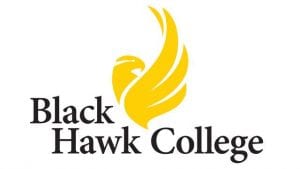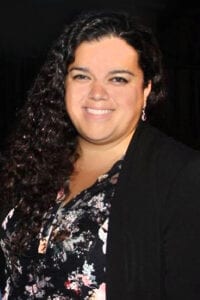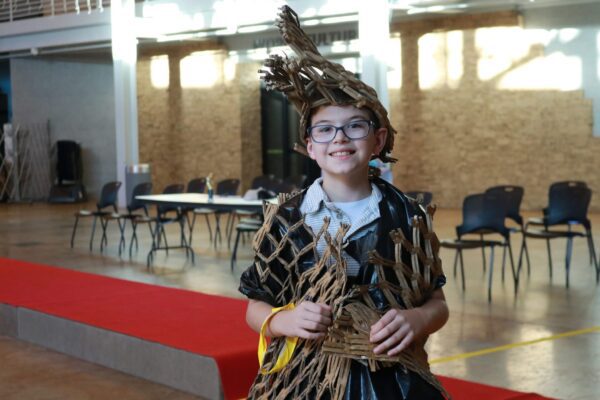Retiring Black Hawk Professor Starts “ABC All-Star” Scholarship, In Honor of Autistic Son
Xixuan Collins of Bettendorf, a biology professor at Black Hawk College, is taking her personal and professional experiences to heart to help other students facing special challenges.

Collins is a native of China who has lived in Iowa since 1997.
She and her family are starting an endowed scholarship, “ABC All-Star,” for students with disabilities at BHC. “ABC” are the initials of their son Ari – a 5th grader who lives with autism and ADHD. It also stands for “American-Born Chinese” (in tribute to their family background) and “all students can be stars and shine,” Collins said recently.
Currently, there is no scholarship for these students at BHC, where Collins has taught for 17 years and is formally leaving in July. Students who have their cases filed with the college disability office and have a 2.0 grade-point average will be eligible for the scholarship.
“Having a child with disabilities has taught me so much about the challenges students with disabilities face each and every day. I wish I could have done more for them as a teacher,” Collins posted on Facebook April 2, which was World Autism Awareness Day.
“Financial support for these students will not solve all their problems, but if it makes it possible for them to work one fewer shift, they may have more time to study for an exam,” she wrote. “If it allows them to put gas in their cars or hire babysitters, they may be able to attend classes regularly. If it makes buying their textbooks not a worry, they may have less anxiety and more brain bandwidth to focus on schoolwork.

The cover of Xixuan Collins’ debut novel, “Flowing Water, Falling Flowers” (Midwest Writing Center Press, 2020).
“Through the scholarship, we also hope to help destigmatize disabilities, including the invisible kinds: autism, ADHD, anxiety, and other forms of mental illness-related disabilities and encourage students to seek help,” Collins said. “All students deserve to receive a good education and achieve their full potentials.”
“With this scholarship, we are able to empower students to continue pursuing their educational goals,” Zenaida Landeros, executive director of the Black Hawk College Foundation, said Monday. “This scholarship invests not only in our diverse student population, but helps to continue fostering an inclusive space within our Quad-Cities community. Once endowed, the ABC All-Star Scholarship will impact one to two students per year in perpetuity.”
The foundation has a scholarship review committee, which collects and rates all scholarship applications for the year. Based on that, the top candidates are further reviewed and a recipient is chosen that best fits the scholarship criteria, Landeros said.
“With the goal that Xixuan has, we hope to give out one to two scholarships a year. It could be from $400-$500 each, but it depends on the investment,” she said. “Once a minimum is met, an endowed scholarship typically begins awarding on its second year — in this case, we are planning for 2023.”
Collins is a native of Sichuan Province, China, and earned her master’s in cell biology from Sichuan University, and a Ph.D in nutrition from Iowa State University. She and her husband Conan moved to Bettendorf in 2004 and their son Ari was born in 2009.
After starting to show symptoms of both attention deficit-hyperactivity disorder (ADHD) and autism spectrum disorder (ASD) at age three,

Xixuan and Conan Collins with their son Ari, at their Bettendorf home.
Ari was diagnosed with both when he was seven, his mom said.
On Monday, Collins expressed her tremendous gratitude for Ari’s teachers at Riverdale Heights Elementary in Bettendorf, who have shown great patience, sensitivity and care in making sure his educational needs are met.
“They’re so awesome, even before his formal diagnosis,” she said, noting he’d often have a classroom aide to work with him on major subjects like reading, math and science, to help him accomplish the class work.
Ari’s needs included keeping his attention focused on task in school and with autism, he had challenges expressing emotion and communicating clearly, Collins said.
“Autism, it was more a communication problem,” she said. “I feel like he’s really sensitive,” but at times, those students don’t express their feelings appropriately – for example, laughing in response to another child crying, Collins said.
Sometimes, it was helpful for Ari to draw pictures of his emotions, to reveal his thinking, she said.
“He’s taught me so much,” Collins said. “I feel like he made me a better teacher.”
Her son also has benefitted from behavioral treatment — before the pandemic, he regularly saw a therapist and behavior coach. Ari also has been helped by the Augustana College center for speech and communication disorders, an autism tennis program, and participating in the Q-C Penguin Project (for students with special needs) in 2018, when they did “Beauty and the Beast,” and Ari was the youngest one.
ACEing Autism is a program that offers private tennis lessons for children on the spectrum, who are spectrum are matched with two

Ari Collins and his dog Max.
volunteers who guide them through the basics of tennis.
The program may potentially be free for children on the spectrum. The Autism Society of the Quad Cities may pay the $120 registration fee for participants.
In 2019, Ari took part in a robotics program with a Riverdale Heights teacher, “which was really awesome,” Collins said, adding high school volunteers helped them.
“Our community is really great,” she said, also crediting the Q-C Autism Society which helps to sponsor an annual autism run that’s a fundraiser.
The 10th-annual Scott Holtan Royal Ball Run for Autism has been postponed from June 19 to Oct. 10 at 10 a.m. (10/10 at 10). Learn more at www.royalballrun.com.
Proceeds from the Royal Ball Run for Autism support local programs dedicated to autism treatment and awareness, and in its first nine years, the run has invested more than $230,000 in local programs. It gave Ari a speech scholarship to help them pay for speech services, Collins said.
She and her son also have enjoyed going to “sensory-friendly” movies at the Putnam’s Giant Screen Theater, sponsored by the Autism Society of the Quad Cities. “It was such a good resource for us. We had been going to that faithfully,” she said.
Launched in 2018, each film in the series was modified to be “friendlier” to the senses — theater lights dimmed but not turned off, volume turned down, movies shown in 2D, few or no trailers before the film and handicapped access to theater. Patrons could move around and make noise during the show. They also can bring in outside food and drink.
Addressing needs at Black Hawk
Over Collins’ time teaching at BHC, she’s struggled with how to meet needs of students who have ADHD, autism or anxiety.

There previously were no scholarships for Black Hawk students with disabilities.
“Our college courses are very intense, then it gets really difficult and then they have like a job or say, I do not take my meds because I don’t like how it makes me feel, then they stop showing up and then there’s nothing you can do,” she said. BHC can make accommodations for students with disabilities, including allowing them to take tests separately and allowing them more time for tests or to finish assignments, Collins noted.
“One student in class, I remember him not talking, during his lab he was pacing, and his teacher was freaking out,” she said, noting the student got a C in the lab while he got an A in her class. Collins didn’t know if he was autistic.
Students who face social and behavioral challenges find a welcoming home at Black Hawk, since it’s a small community college, she said.
“One student, because of anxiety and depression, couldn’t handle a big school away from home, but with community college, we have such small class size, I know individual students,” Collins said, noting students get much greater attention at BHC than bigger schools.
Removing some stress is a main motivation for her to start the new scholarship. She wants to make it easier for students to get help they need.
“I want to encourage them to get help and that’s why I say, we’ll have your case filed with the disability office, and that’s pretty much the only requirement,” Collins said.
“A lot of students, when they apply for scholarships, they have to have GPA this high, but for these kids, it’s already so hard,” she said. “I want to encourage them to get help, have your kids filed with the disability office.”
“Financial relief will help them,” Collins said. “We have to have money two years to accrue before we can give the scholarship. They can use that for books, tuition. It’s a little bit of relief – if they’re working, maybe they don’t have to work as much. It’s definitely not going to solve the problem altogether.”
Juggling a new novel and home-schooling
While Collins has lived in Iowa since 1997, she’s only written in English since 2015. Her debut novel, “Flowing Water, Falling Flowers” from

Young past participants in the Royal Ball Run for Autism, which this year will be held on Oct. 10 at 10 a.m. in Milan.
the Rock Island-based Midwest Writing Center Press, was released last October, and she’s writing her second, a story about an extraordinary woman and her ghost mother.
She’s on unpaid leave for a year from Black Hawk, until July, which she did for her writing and to help her son Ari.
“After the book came out, I thought I’d do some promotion and Ari was entering 5th grade,” Collins said of the need to take leave from teaching. “I thought, this is more demanding and I feel like I’m very stressed out trying to handle both. It worked out really well, because of the pandemic. Otherwise, I don’t know how I would have survived, trying to teach and then trying to also have my son for a while at home.”
Last spring, Ari did remote learning from home and in the fall, his school did a hybrid of half the week in person and half online.
“He really loves school, and as special needs, he has an aide in the classroom with him,” Collins said. “It’s become really difficult to try to do that at home. So he wanted to go.”
After Christmas break, due to Covid concerns, Ari and his family had to quarantine at home for two weeks in January. He later went back to school in person.

Collins and her son (who’s now in 5th grade), wearing Chinese outfits, taken during Chinese New Year 2018.
“I think the reason for me to try to do a scholarship is, having him makes me realize how hard he’s working,” Collins said. “It’s not like he’s not trying…They just work in different ways. So I just feel like, I really want people to understand that it’s not like he’s a bad kid.”
With autism and ADHD, Ari sometimes has a hard time interacting with other kids, and as an only child, his parents try to schedule play time with other neighborhood kids.
According to the Autism Society of the Quad Cities, there are no medical tests for diagnosing autism. An accurate diagnosis must be based on observation of the individual’s communication, social interaction, and his or her activities and interests, says www.autismqc.org/about-autism.php.
Because many of the behaviors associated with autism are common to other disorders, some medical tests can be performed in order to identify other causes or diagnoses. People with autism often have symptoms of various co-occurring mental, behavioral and physical conditions, the site says.
Because autism is a spectrum disorder, it can range from very mild to very severe and occur in all ethnic, socioeconomic and age groups, according to the National Autism Association. Males are four times more likely to have autism than females. Some children with autism appear normal before age 1 or 2 and then

BHC had a total 2020 enrollment of 7,014 students, including its East Campus in Galva, Ill., 50 miles east of Moline.
suddenly “regress” and lose language or social skills they had previously gained.
A person with ASD might:
- Not respond to their name (the child may appear deaf)
- Not point at objects or things of interest, or demonstrate interest
- Not play “pretend” games
- Avoid eye contact
- Want to be alone
- Have difficulty understanding, or showing understanding, or other people’s feelings or their own
- Have no speech or delayed speech
- Repeat words or phrases over and over (echolalia)
- Give unrelated answers to questions
- Get upset by minor changes
- Have obsessive interests
- Flap their hands, rock their body, or spin in circles
- Have unusual reactions (over or under-sensitivity) to the way things sound, smell, taste, look, or feel
- Have low to no social skills
- Avoid or resist physical contact
- Demonstrate little safety or danger awareness

Black Hawk College accepts scholarship applications until May 15, and typically awards $100,000 in scholarships each year.
The following are facts about autism (according to the ASQC):
- Prevalence in the U.S. is estimated at 1 in 68 births.
- More than 3.5 million Americans live with an autism spectrum disorder.
- Autism is the fastest-growing developmental disability.
- Prevalence increased by 6 to 15 percent each year from 2002 to 2010.
- Autism services cost U.S. citizens over $236 billion annually.
- Cost of lifelong care can be reduced by 2/3 with early diagnosis and intervention.
- The U.S. cost of autism over the lifespan is about $2.4 million for a person with an intellectual disability, or $1.4 million for a person without intellectual disability.
- 35 percent of young adults (ages 19-23) with autism have not had a job or received education after high school.
- Less than 39 percent of students with autism graduate from college, according to collegeautismnetwork.org.

Zenaida Landeros is executive director of the Black Hawk College Foundation.
Collins encourages people to donate to the BHC scholarship this month, to honor national Autism Awareness Month. How to donate:
- Go to https://bhcqc.securepayments.cardpointe.com/pay?type=donate
- Put in the donation amount.
- This is very important: on “Location,” click the dropdown button, and select “ABC All-Star Scholarship Fund.”
- Enter the rest of the information.
The Autism Society of the Quad Cities is a chapter of the Autism Society of America (www.autism-society.org). It serves Scott, Muscatine, and Clinton counties in Iowa, and Rock Island and Henry counties in Illinois.
For more information, visit www.autismqc.org.













Leave a Reply
You must be logged in to post a comment.